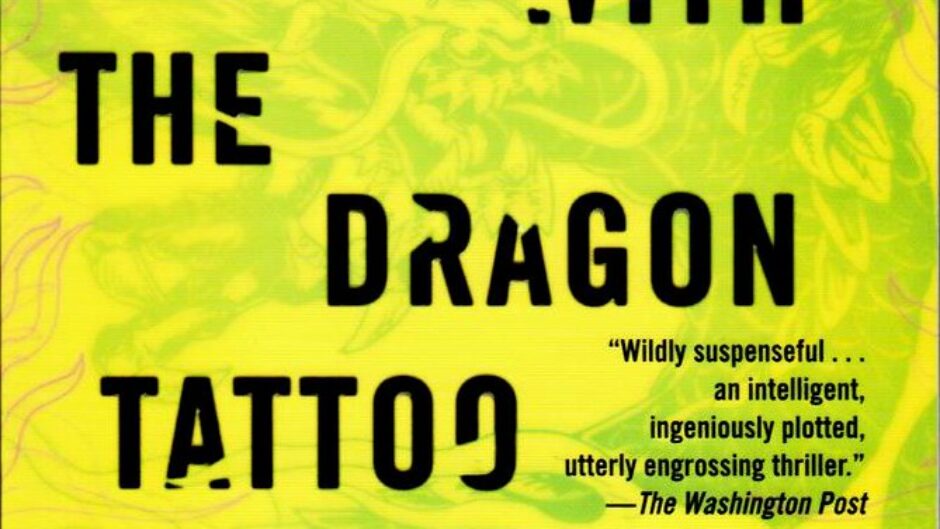My interest in books tends to vary inversely to the amount of hype, so I had about zero curiousity in The Girl with the Dragon Tattoo. But then both my parents recommended the series highly, and they both have great (and divergent) taste in books, so I figured if they both enjoyed it, maybe I really was missing out in my Stieg Larsson-less existence.
So I borrowed Dragon Tattoo, the first novel of the trilogy, and I slogged through the first hundred or so pages before finally finding myself engrossed. I didn’t expect that it would take so long to get into it, but I honestly found the first 1/5 of the book to be pretty dull. After that, I’ll admit that I was compelled to keep reading and interested to see what would happen. The other thing I’ll concede is that the titular Girl is a fascinating character– antisocial, extremely clever, tough and self-reliant but at the same time very insecure, unapologetically sexual, violent… Lisbeth Salander is a unique protagonist.
The original Swedish title of the novel translates to “Men Who Hate Women,” and Larsson was a self-described feminist who deplored violence against women. I’m not the first to find fault, though, with the premise that either the book or Lisbeth are feminist themselves. Lisbeth kicks a lot of ass, but she also lacks any sort of self-confidence, repeatedly deriding her looks (boobs are too small), intelligence (thinks her photographic memory makes her a freak), and life in general(it’s a “rat’s nest”), which I think undermines the argument that she’s a feminist heroine.
As for the novel, explicit descriptions of violence against women don’t do anything to solve the problem. And the fact that the book takes a strong stance against rape and murder doesn’t make it feminist either–who doesn’t oppose those things, other than rapists and murderers?
As I said, I’m not the first to make these observations. Whiel some reviewers have bought into the feminist triumph trope, others have been more skeptical. The Rejectionist, blogging at Tiger Beatdown, captured it well I thought:
I am certainly curious, as I think are many ladies, as to why some men hate women so much; that, I believe, is a question worth exploring. And since ladies have had little success so far in answering it, perhaps it is time for the gentlemen to start doing some of the heavy lifting around here. But here’s a hint, fellows: writing a story about [spoilers about graphic scenes in the book] is not a successful answer to this question.
Anyone who has read and enjoyed Dragon Tattoo, or thinks Larsson is indeed a feminist hero, please chime in and let me know what I’m missing!





I don’t have any particular interest in these books, having only seen the first movie, but I have to respond, because I find this line thinking very bizarre.
The idea here, it sounds like, is that in order for a character to be properly “feminist” she has to exist without the kinds of flaws and insecurities that plague virtually everyone on earth, male or female? What? The point of a (modern) literary hero is that they manage to transcend the human frailties that everyone has to do amazing things. The fact the Lispeth is such a damaged person with fairly typical insecurities should heighten, not diminish, her accomplishments.
You can build the perfect feminist hero if you like, but she will be boring and uninspiring.
Having said all that, I largely agree with the latter point. I found the movie to be little but high-minded torture porn, but then it’s not really my kind of thing.
Hmm, I think you make a good point. However, I’d argue that what you’re saying means that Lisbeth is a better hero(ine) than she would be without the flaws and obstacles, not a better feminist heroine. I guess in my mind, a feminist protagonist would be a role model for women, and Lisbeth’s self-hatred in particular (as opposed to other sorts of flaws) makes her ill-equipped to be a strong role model even though she clearly accomplishes a lot.
I tend to use hero to cover both genders, that’s just how I roll, eliminates that nasty hero/will eliminating drug ambiguity.
The distinction you make is a fair one, but I’d argue that a book/movie like this one is a place where you’d expect to find a hero, not a role model.
Actually, I’d go further. The difference between a hero and a role-model is distinction rooted in perspective. To you, Lispeth is a sort of pitiable hero, because her baseline state is much more troubled than your own. However, to someone who was (or at least perceived themselves to be, like any teenager) as troubled as Lispeth, she might indeed serve as a relate-able role model until that person is in a better place. The distinction you make then is one of degree, not type.
Actually, I’d go further. The difference between a hero and a role-model is distinction rooted in perspective. To you, Lispeth is a sort of pitiable hero, because her baseline state is much more troubled than your own. However, to someone who was (or at least perceived themselves to be, like any teenager) as troubled as Lispeth, she might indeed serve as a relate-able role model until that person is in a better place. The distinction you make then is one of degree, not type.